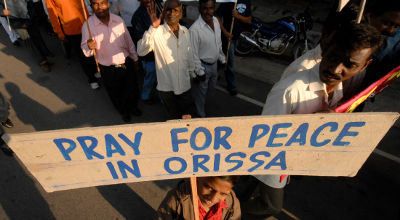Christians Falsely Accused of Killing Hindu Nationalist Still in Jail After 3 1/2 Years
Seven Christians were accused of killing a Hindu nationalist leader, Laxmanananda Saraswati, in India’s eastern state of Orissa in 2008 despite Maoists claiming responsibility. The accused men remain in jail 3 1/2 years later without a fair trial, while thousands of others who survived the country’s most brutal spate of anti-Christian attacks following the murder are still living in fear.
In what appears to be a deliberate attempt to keep the accused in jail, prosecutors have delayed court dates and judges have repeatedly failed to show up for hearings.
International Christian Concern (ICC) spoke to Advocate Pratap Chhinchani, the attorney of the seven accused—all married with children—who are lodged in the district jail in Phulbani, headquarters of Orissa’s Kandhamal district.
Yet, in spite of these instructions and the lack of evidence against them, the accused—identified as Bijay Kumar Sunseth, Gornath Chalanseth, Budhadeb Nayak, Bhaskar Sunamajhi, Durjo Sunamajhi, Munda Badmajhi, and Sanatan Badmajhi—remain in jail. The imprisonment is all the more absurd, given that the Maoists freely took responsibility for the crime and have been formally charged as the main accused in the case.
Chhinchani suggested the prosecutors were helping the state government “save face”, as the authorities “do not have the guts to nab the real culprits.” Hindu nationalists are powerful and influential, and the government apparently does not want to anger them by releasing the falsely accused Christians.
The apathy of the authorities to set things right has resulted in four families being left rudderless. Between them, the men have nearly 30 children, most of whom were less than 10 years old when their fathers were arrested. The wives and older children struggle to make ends meet. Some of them are forced to depend on the support of generous benefactors. All of them were arrested without being informed of the charges against them, four of them being dragged away from their homes in the middle of the night.
Tragically, the murder of Saraswati was quickly followed by widespread violence against Christians in the region, fueled by the propaganda of local Hindu nationalists who are believed to be the brains behind the attacks. News of the murder on Aug. 23, 2008 spread along with rumors that Christians were to blame. A spark turned into a fire that affected thousands of Christians before anyone could step in and restore some sort of order.
According to government figures, more than 600 villages were ransacked, 5,600 houses in 415 villages were looted and set on fire, 54,000 people were left homeless and 38 people were murdered. Nearly 300 churches were destroyed, along with a number of convents, schools, hostels and welfare facilities. Many of the victims lost identity papers and title deeds that are vital to exercise their basic constitutional rights.
In general, Christians who survived the attacks remain in difficult circumstances. Christians who worked as laborers, farmers or craftsmen before the violence lost their jobs and endure a systematic boycott by the Hindu majority. Most of them live on less than a dollar a day. After fleeing from the violence, at least 10,000 Christians remain homeless and are forced to live in ghettos.
Through the initiative of the Church, homes have been rebuilt in various villages, but the Christian community still lives in the shadow of fear. In places like the village of Beticola, families were told not to return unless they converted to Hinduism.
The arrest of Christians and subsequent attacks on the community were driven by sinister political motivations. In many parts of the country where tribals or aboriginals live, it has been a tragic but common practice to use national and religious identity to mask political ambition.
Tribals comprise only nine percent of India’s population, but their votes are crucial. The Hindu nationalist Bharatiya Janata Party, or the BJP, has found it tough to win their vote, competing with their opponents—India’s Grand Old Congress party—and the valued work of Christian missionaries in the region.
To garner support for themselves, Christians are regularly demonized by Hindu nationalists to gain political mileage among the tribals. They incite the locals to despise Christians, under the illusion of protecting the interests of the nation against an “intrusive, foreign” religion. The murder gave Hindu nationalists the perfect alibi to inspire and execute an organized pogrom against Christians, thus perpetuating a false national and religious identity, of which they are presented as the guardians.
However, things are not entirely bleak. In recent months, a Capuchin priest, Father Nithiya, organized a group that has succeeded in compelling the government to issue new papers to more than 400 families. They have also been able to provide more than a thousand victims with necessary psychological support. Activists have helped bridge the gap between victims and projects that provide food and financial aid to widows, single mothers and children.
As for their faith, the imprisoned men continue to trust in God for their vindication. Visitors to the region have testified that Christians in Kandhamal persevere in worshipping God through these trials, still affirming His sovereignty and omnipotence.
But as Kandhamal gradually returns to order, the court in Orissa remains obligated to complete the trial of the falsely accused and ensure that they are restored to their families without any further delay.
This article is originally from International Christian Concern. Click here to visit their website.




























































